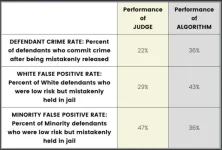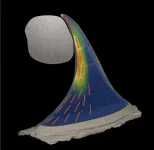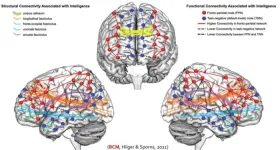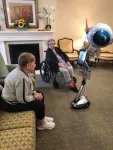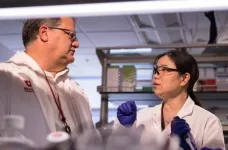(Press-News.org) HOUSTON and REDWOOD CITY, Calif. ― The University of Texas MD Anderson Cancer Center and AmMax Bio, Inc. today announced a worldwide exclusive license agreement and clinical trial agreement to develop and advance AmMax’s AMB-066 monoclonal antibody therapy as a first-in-class treatment option for patients with colorectal cancer (CRC) and minimal residual disease (MRD) as well as those with MRD in other solid tumors.
Under the agreements, AmMax and MD Anderson will build upon preclinical discoveries made by MD Anderson researchers to evaluate the potential for AMB-066, which targets colony stimulating factor 1 receptor (CSF1R), in a Phase IIa proof-of-concept study, with patient enrollment anticipated to begin soon.
“AmMax sets out to bring innovative and practice-changing medicines to patients with cancer,” said Larry Hsu, Ph.D., chairman and chief executive officer of AmMax. “These agreements underscore our commitment to oncology innovation, and we look forward to our collaboration to evaluate AMB-066 in this setting to explore its potential to address a significant unmet medical need.”
Minimal residual disease refers to cells remaining after treatment that can cause a relapse of the cancer. In CRC, MRD is defined by the presence of circulating tumor DNA without radiographic evidence of a tumor. In the United States, an estimated 20,000 patients with CRC have MRD after definitive therapy, including curative intent surgery with or without neoadjuvant and/or adjuvant therapies. These patients are at an increased risk to relapse or develop metastasis to other organs, primarily the liver. Currently, there are no approved therapies for CRC MRD, and the standard of care is simply observation.
A research team led by Scott Kopetz, M.D., Ph.D., professor of Gastrointestinal Medical Oncology and associate vice president for Translational Integration at MD Anderson, identified a potential opportunity for AMB-066 to effectively treat MRD-positive CRC in preclinical studies. These discoveries are covered by the licensing agreement.
“Patients with colorectal cancer who have minimal residual disease following standard therapy are at increased risk of recurrence and need more effective treatment options to ensure the cancer does not return,” Kopetz said. “We look forward to collaborating with AmMax to evaluate AMB-066 in this setting, based on our robust preclinical data and a large clinical safety database.”
Under the terms of the license agreement, MD Anderson is entitled to upfront and milestone payments, as well as royalties on net sales of certain products.
Read this press release in the MD Anderson Newsroom.
-30-
Disclosure
MD Anderson has an institutional conflict of interest with AmMax Bio, and this relationship will be managed according to an MD Anderson Institutional Conflict of Interest Management and Monitoring Plan.
About AmMax Bio
AmMax, founded by Larry Hsu, Ph.D., in 2020, is a clinical-stage biotechnology company focused on the development of innovative therapeutics for cancer patients. AmMax has built a robust pipeline addressing significant unmet needs and large commercial opportunities. The Company’s pipeline includes primarily AMB-066 for CRC MRD, AMB-104, a novel antibody-drug conjugate for acute myeloid leukemia (AML), and AMB-051, an intra-articular injection for tenosynovial giant cell tumor (TGCT). For more information, please visit AmMaxBio.com.
About MD Anderson
The University of Texas MD Anderson Cancer Center in Houston ranks as one of the world's most respected centers focused on cancer patient care, research, education and prevention. The institution’s sole mission is to end cancer for patients and their families around the world, and, in 1971, it became one of the nation’s first National Cancer Institute (NCI)-designated comprehensive cancer centers. MD Anderson is No. 1 for cancer in U.S. News & World Report’s “Best Hospitals” rankings and has been named one of the nation’s top two hospitals for cancer since the rankings began in 1990. MD Anderson receives a cancer center support grant from the NCI of the National Institutes of Health (P30 CA016672).
END
MD Anderson and AmMax Bio announce agreements to advance development of AMB-066 in colorectal cancer patients with minimal residual disease
Collaboration to evaluate monoclonal antibody as first-in-class treatment in this setting
2024-12-10
ELSE PRESS RELEASES FROM THIS DATE:
Choosing between human and algorithmic decision-makers
2024-12-10
Society increasingly uses algorithms to make weighty decisions in contexts including criminal justice, healthcare, and finance, a trend that has been criticized for institutionalizing bias and sacrificing fairness. In a pre-registered study, Kirk Bansak and Elisabeth Paulson asked 9,000 US-based study participants to choose between decision-makers for two high stakes situations: pretrial release and bank loan applications. Participants chose either between two human decision-makers, between two algorithmic decision-makers, or between ...
High-speed rail and regional environmental inequality
2024-12-10
The introduction of high-speed rail reduced spatial environmental inequality in China by helping elements such as green technologies spread across the country. Shengjun Zhu and colleagues hypothesized that the introduction of high-speed rail between 1998 and 2010 helped facilitate the spread of elements including capital, labor, green technology, and information, particularly from leading to lagging areas. These trends could contribute to the reduction of industrial pollution, and the authors hypothesized that ...
Long-distance friendships can provide conservation benefits
2024-12-10
PULLMAN, Wash. – While sustaining friendships from afar can be challenging, they may offer unexpected benefits for environmental conservation.
A Washington State University-led study, recently published in Conservation Letters, found that these social ties can positively influence community-based conservation. While the study focused on 28 fishing villages in northern Tanzania, it has potential broader implications for global conservation efforts.
“Our findings challenge the notion that external connections undermine conservation,” said Kristopher Smith, the study’s lead author and a postdoctoral ...
The biomechanics of the rose prickle
2024-12-10
It is said that every rose has its thorn, but technically speaking, roses have prickles. Prickles are derived from the epidermis of the plant, whereas true thorns are modified stems. Rose prickles defend the plant from herbivores and help the plant support itself on surrounding objects. Liat Levavi and Benny Bar-On investigated the biomechanical properties of the prickles of the dog rose (Rosa canina Linnaeus) with a view towards features that might be used in the design of miniature anchoring platforms. ...
Machine learning prediction of human intelligence
2024-12-10
AI can predict human intelligence by looking at the connections of a working human brain. Neuroscientists can predict intelligence from brain structure and function—to a point. Previous studies have suggested that intelligence is widely distributed across the brain. Kirsten Hilger and colleagues used machine learning models to predict multiple kinds of intelligence from brain connections of 806 healthy adults while resting and while completing tasks. Fluid intelligence includes inductive and deductive reasoning abilities that do not rely on context, while crystallized intelligence reflects the ability to apply knowledge from ...
Empowering older adults with home-care robots
2024-12-10
Advances in medicine have led to an increase in human longevity. Estimates suggest that by 2030, one in every six individuals globally will be aged over 60 years. This rapid increase in the aging population implies a larger number of aged individuals requiring care. Family members and professional caregivers may not be able to meet this increasing demand. Furthermore, reports suggest a significant shortage of workforce, including nurses, in several developed countries, underscoring the need for additional strategies that ...
New concept for sustainable fuel cell polymer electrolytes overcomes barriers in high-temperature, low-humidity use, advancing net-zero carbon goals
2024-12-10
A research group led by Atsushi Noro at Nagoya University in Japan has announced a novel design concept for fuel cell electrolytes, utilizing a phosphonic acid polymer with hydrocarbon spacers. This innovative concept allows fuel cells to operate effectively under high-temperature (above 100°C) and low-humidity conditions, addressing crucial barriers to their broader use. The research has been published in ACS Applied Polymer Materials.
By electrochemically reacting hydrogen and oxygen, fuel cells produce electricity while emitting only water, highlighting their clean energy capabilities. However, perfluorosulfonic ...
Sculpting the brain (without chisel or scalpel)
2024-12-10
Imagine being able to inscribe a new pattern of activity into a person’s brain that would allow for faster learning, or better treatment of psychiatric and developmental disorders such as depression or autism. Now imagine being able to do that in a way that doesn’t require brain surgery or any physical manipulation. Sounds like science fiction?
It still is. But that’s exactly what Coraline Iordan, an assistant professor of brain and cognitive sciences and of neuroscience at the University of Rochester has been working toward, showing for the ...
Wrong trees in the wrong place can make cities hotter at night, study reveals
2024-12-10
University of Cambridge media release
Wrong trees in the wrong place can make cities hotter at night, study reveals
UNDER STRICT EMBARGO UNTIL 10:00 AM UK TIME / 05:00 AM (US ET) ON TUESDAY 10TH DECEMBER 2024
While trees can cool some cities significantly during the day, new research shows that tree canopies can also trap heat and raise temperatures at night. The study aims to help urban planners choose the best combinations of trees and planting locations to combat ...
New gene therapy reverses heart failure in large animal model
2024-12-10
A new gene therapy can reverse the effects of heart failure and restore heart function in a large animal model. The therapy increases the amount of blood the heart can pump and dramatically improves survival, in what a paper describing the results calls “an unprecedented recovery of cardiac function.”
Currently, heart failure is irreversible. In the absence of a heart transplant, most medical treatments aim to reduce the stress on the heart and slow the progression of the often-deadly disease. But if the gene therapy shows similar ...
LAST 30 PRESS RELEASES:
ASU researchers to lead AAAS panel on water insecurity in the United States
ASU professor Anne Stone to present at AAAS Conference in Phoenix on ancient origins of modern disease
Proposals for exploring viruses and skin as the next experimental quantum frontiers share US$30,000 science award
ASU researchers showcase scalable tech solutions for older adults living alone with cognitive decline at AAAS 2026
Scientists identify smooth regional trends in fruit fly survival strategies
Antipathy toward snakes? Your parents likely talked you into that at an early age
Sylvester Cancer Tip Sheet for Feb. 2026
Online exposure to medical misinformation concentrated among older adults
Telehealth improves access to genetic services for adult survivors of childhood cancers
Outdated mortality benchmarks risk missing early signs of famine and delay recognizing mass starvation
Newly discovered bacterium converts carbon dioxide into chemicals using electricity
Flipping and reversing mini-proteins could improve disease treatment
Scientists reveal major hidden source of atmospheric nitrogen pollution in fragile lake basin
Biochar emerges as a powerful tool for soil carbon neutrality and climate mitigation
Tiny cell messengers show big promise for safer protein and gene delivery
AMS releases statement regarding the decision to rescind EPA’s 2009 Endangerment Finding
Parents’ alcohol and drug use influences their children’s consumption, research shows
Modular assembly of chiral nitrogen-bridged rings achieved by palladium-catalyzed diastereoselective and enantioselective cascade cyclization reactions
Promoting civic engagement
AMS Science Preview: Hurricane slowdown, school snow days
Deforestation in the Amazon raises the surface temperature by 3 °C during the dry season
Model more accurately maps the impact of frost on corn crops
How did humans develop sharp vision? Lab-grown retinas show likely answer
Sour grapes? Taste, experience of sour foods depends on individual consumer
At AAAS, professor Krystal Tsosie argues the future of science must be Indigenous-led
From the lab to the living room: Decoding Parkinson’s patients movements in the real world
Research advances in porous materials, as highlighted in the 2025 Nobel Prize in Chemistry
Sally C. Morton, executive vice president of ASU Knowledge Enterprise, presents a bold and practical framework for moving research from discovery to real-world impact
Biochemical parameters in patients with diabetic nephropathy versus individuals with diabetes alone, non-diabetic nephropathy, and healthy controls
Muscular strength and mortality in women ages 63 to 99
[Press-News.org] MD Anderson and AmMax Bio announce agreements to advance development of AMB-066 in colorectal cancer patients with minimal residual diseaseCollaboration to evaluate monoclonal antibody as first-in-class treatment in this setting
